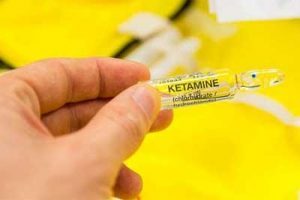- Home
- Editorial
- News
- Practice Guidelines
- Anesthesiology Guidelines
- Cancer Guidelines
- Cardiac Sciences Guidelines
- Critical Care Guidelines
- Dentistry Guidelines
- Dermatology Guidelines
- Diabetes and Endo Guidelines
- Diagnostics Guidelines
- ENT Guidelines
- Featured Practice Guidelines
- Gastroenterology Guidelines
- Geriatrics Guidelines
- Medicine Guidelines
- Nephrology Guidelines
- Neurosciences Guidelines
- Obs and Gynae Guidelines
- Ophthalmology Guidelines
- Orthopaedics Guidelines
- Paediatrics Guidelines
- Psychiatry Guidelines
- Pulmonology Guidelines
- Radiology Guidelines
- Surgery Guidelines
- Urology Guidelines
Ketamine Nasal spray for rapid treatment of depression

Ketamine has been found to be effective in refractory depression.The researchers have developed a nasal spray formulation of ketamine that shows promise in the rapid treatment of symptoms of major depression and suicidal thoughts. The new study has been published in The American Journal of Psychiatry (AJP).
The double-blind study compared the standard treatment plus an intranasal formulation of esketamine, part of the ketamine molecule, to standard treatment plus a placebo for rapid treatment of symptoms of major depression, including suicidality, among individuals at imminent suicide risk. The study involved 68 participants randomly assigned to one of two groups - either receiving esketamine or placebo twice a week for four weeks. All participants continued to receive treatment with antidepressants throughout. The researchers looked at effects at four hours after first treatment, at 24 hours and at 25 days.
The study was conducted by researchers at Janssen Research and Development and Janssen Scientific Affairs, Titusville, N.J., and San Diego, and the Yale School of Medicine, New Haven, Conn. They found a significant improvement in depression scores and decreased suicidal ideation in the esketamine group compared to the placebo group at four hours and at 24 hours. The esketamine effects were not greater than the placebo at 25 days. The measurement of suicide risk took into consideration both the patient's and clinician's perspectives.
The results of the study support nasal spray esketamine as a possible effective rapid treatment for depressive symptoms in patients assessed to be at imminent risk for suicide, according to the authors. Esketamine could be an important treatment to bridge the gap that exists because of the delayed effect of most common antidepressants. Most antidepressants take four to six weeks to become fully effective.
This study was a proof-of-concept, phase 2, study for esketamine; it must still go through a phase 3 study before possible FDA approval. It was funded by Janssen Research and Development, LLC.
The authors caution that more research is needed on the potential for abuse of ketamine. That caution is also the focus of an accompanying AJP editorial also published online today. In the editorial, AJP Editor Robert Freedman, M.D., along with members of the AJP Editorial Board, note the known potential for abuse and existing reports of abuse of prescribed ketamine. They discuss the need for additional research relating to the abuse potential of ketamine during phase 3 trials, such as monitoring of patients' craving and potential ketamine use from other sources.
While it is the responsibility of physicians to provide a suicidal patient with the fullest range of effective interventions, the AJP Editor's note, "protection of the public's health is part of our responsibility as well, and as physicians, we are responsible for preventing new drug epidemics." The Editors suggest the need for broad input in the development of effective controls on the distribution and use of ketamine.
Freedman and colleagues argue that steps to control the use of ketamine would not be aimed at preventing its use for beneficial purposes but would allow for treatment to "continue to be available to those with need, while the population that is at-risk for abuse is protected from an epidemic of misuse."
For more details click on the link : http://dx.doi.org/10.1176/appi.ajp.2018.17060720

Disclaimer: This site is primarily intended for healthcare professionals. Any content/information on this website does not replace the advice of medical and/or health professionals and should not be construed as medical/diagnostic advice/endorsement or prescription. Use of this site is subject to our terms of use, privacy policy, advertisement policy. © 2020 Minerva Medical Treatment Pvt Ltd